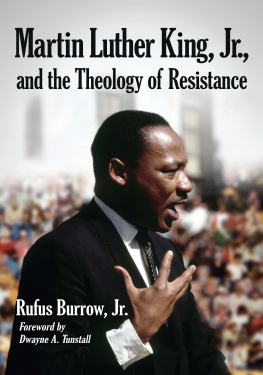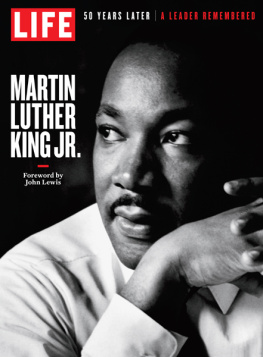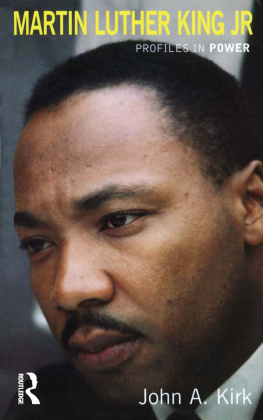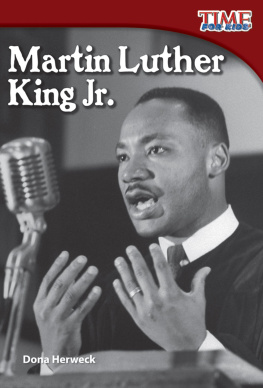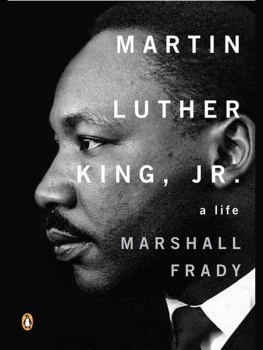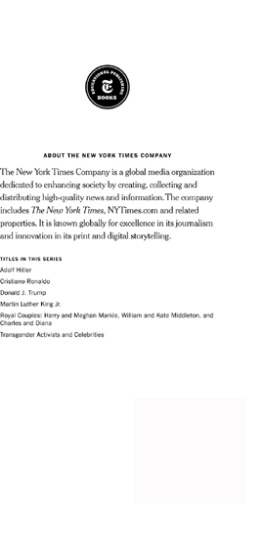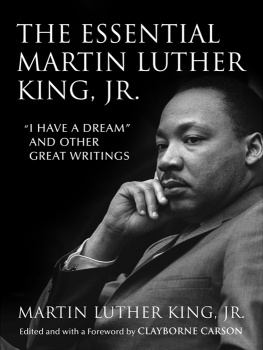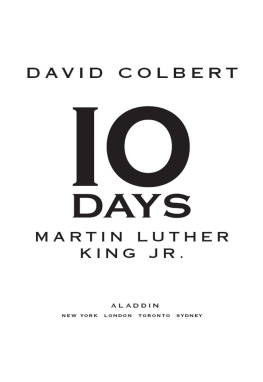
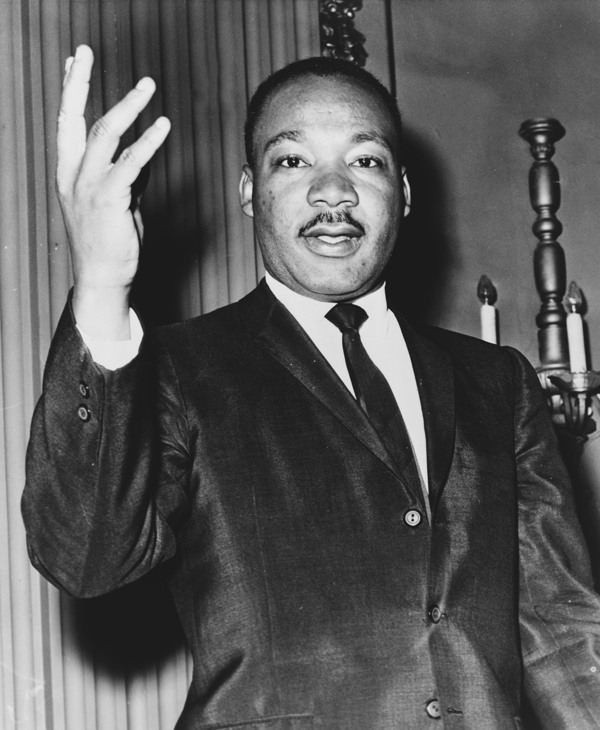
Martin Luther King, Jr., 1964
(Library of Congress, World Telegram & Sun photograph
by Dick DeMarsico, LC-USZ62-126559)
Martin Luther King, Jr.,
and the Theology of Resistance
Rufus Burrow, Jr.
Foreword by Dwayne A. Tunstall

McFarland & Company, Inc., Publishers
Jefferson, North Carolina
Also by RUFUS BURROW, JR.
James H. Cone and Black Liberation Theology
(McFarland 1994; paperback 2001)
LIBRARY OF CONGRESS CATALOGUING DATA ARE AVAILABLE
BRITISH LIBRARY CATALOGUING DATA ARE AVAILABLE
e-ISBN: 978-1-4766-1732-9
2015 Rufus Burrow, Jr. All rights reserved
No part of this book may be reproduced or transmitted in any form or by any means, electronic or mechanical, including photocopying or recording, or by any information storage and retrieval system, without permission in writing from the publisher.
On the front cover: The Reverend Dr. Martin Luther King, Jr., 1960s (Photofest)
McFarland & Company, Inc., Publishers
Box 611, Jefferson, North Carolina 28640
www.mcfarlandpub.com
To the memory of my oldest sister,
Miss Linda Kaye Burrow (19502014).
She was, to use the word coined
by the poet Maya Angelou, my shero.
Acknowledgments
Over the past twenty years I have written and published many articles on various aspects of the life, ideas, and socio-ethical practice of Martin Luther King, Jr. Although I have published in a number of different journals, it is fair to say that the vast majority of the publications on King were submitted to my journal of choice, Encounter, the faculty journal at Christian Theological Seminary in Indianapolis, Indiana, where I have taught theological social ethics for more than thirty years. I have intentionally published most of my articles in this journal both because the editors have always encouraged faculty members to submit their work, and because I always felt that I had the freedom to essentially say what I wanted to say. Moreover, I have felt comfortable to introduce new ideas in Encounter. There was a kind of tacit agreement that these ideas would always be well documented and supported by good, solid research. Indeed, publishing in Encounter gave me the opportunity to find my own niche in King Studies, which turned out to be what I call the man of ideas and ideals genre. This area of King Studies stresses the ongoing dance between European, European American, and black southern, religious, familial, and cultural influences on King. The focus on specific ideas and ideals that King himself brought to the table, and how they impacted what he was introduced to from college through doctoral studies, is seen to be an important key to understanding the real Martin Luther King, Jr. By the time King had his Ph.D. in hand, he was not simply the product of European and European American influences. Rather, he was an amalgam of black family, black southern cultural and black religious influences that were intricately intermingled with the ideas and ideals of great Western thinkers and the best of Western cultural traditions. This made him unashamedly both black and American.
The most recent editor of Encounter, Professor Ronald James Allen, was one of two people who encouraged me to think about publishing a collection of my journal articles on King in a book. A former teacher, Dean Emeritus James Earl Massey, was the other person. I am grateful to both men for cheering my work over many years. I have had the good fortune of having Dean Massey read a number of my publications in manuscript form and to make (what Lewis V. Baldwin calls) diplomatic criticisms and suggestions for improvement. He has also been kind enough to encourage me in my teaching and scholarship over many years.
Professor Randall Auxier of Southern Illinois University in Carbondale, Illinois, has been very helpful in providing an outlet for my work on King and personalism, whether through publications in The Personalist Forum (for which he served as editor for several years, before it was renamed The Pluralist), or through inviting me to give, or respond to, papers presented to the Eastern Division of the American Philosophical Association (The Personalistic Discussion Group). I have found Randy to be a kindred spirit in both personalist and King Studies. I shall forever be grateful to him for making it possible for my work on King and personalism to be acknowledged and honored at a meeting of the Personalistic Discussion Group in Chicago in 2010. The papers presented were published in The Pluralist (The Journal of the Society of the Advancement of American Philosophy) in the spring issue of 2011. Professors Lewis V. Baldwin and Dwayne Tunstall of Vanderbilt University and Grand Valley State University, respectively, read excellent papers on various aspects of my work on King, and I responded to them. White male academicians do not get better than Randy Auxier when it comes to supporting, using, and applauding the work of colleagues across racial-ethnic-cultural lines.
My most significant, and deeply respected dialog partner in King Studies over many years is recently retired Vanderbilt University professor, Lewis Velvet Baldwin, who I can only characterize as King scholar extraordinaire, and arguably the top King scholar in the world today. He is this, not merely because of his voluminous writings on King, but because of the sheer quality and thoroughness of his work, as well as his own witness to, and application of, Kings ideas. In addition, there is the matter of the genuineness of Baldwins commitment to teaching an entire generation about the witness and sacrifice of the true Martin Luther King, Jr. and what that must mean for us today, rather than to allow an invented King, e.g., the King of secular and religious right wing conservatives, to gain ascendancy. Lewis Baldwin has been the consummate scholar, and more, my friend.
I was quite intentional about asking Professor Dwayne A. Tunstall to write the foreword to this collection. Even before I met Tunstall some years ago, his doctoral advisor (Randall Auxier) had boasted to me about a bright, energetic, rising personalist who happened to be one of his top Ph.D. students in philosophy, and was black. I discovered this, and much more, to be true when I heard Tunstall, then working on his dissertation, read a paper on the beloved community concept in Josiah Royce and Martin Luther King, Jr., at a meeting of the American Philosophical Association meeting in Chicago. I had the good fortune to be a respondent to his paper. Our paths crossed a number of times thereafter, and I became increasingly impressed with his sharpness of mind and his careful interpretations of Kings ideas and personalist philosophy (the philosophy that King took as his own). I have no doubt that Dwayne Tunstall is a rising star in both personalist and King Studies, who has already begun to make his mark in both. I am truly honored and thankful that he agreed to introduce this volume.
In addition to the articles published in Encounter approximately one third of the chapters in this book were first presented at King Day celebrations, or delivered in classroom settings at various colleges and theological schools. I wish to thank each of those communities for inviting me to speak, but more so, I thank the members of each school for having patiently listened to what I had to say, particularly those instances in which I was more interested in learning from them during the discussion periods. I thank them for allowing me to bounce ideas off them, as well as the benefits gained from their contributions.
Next page
